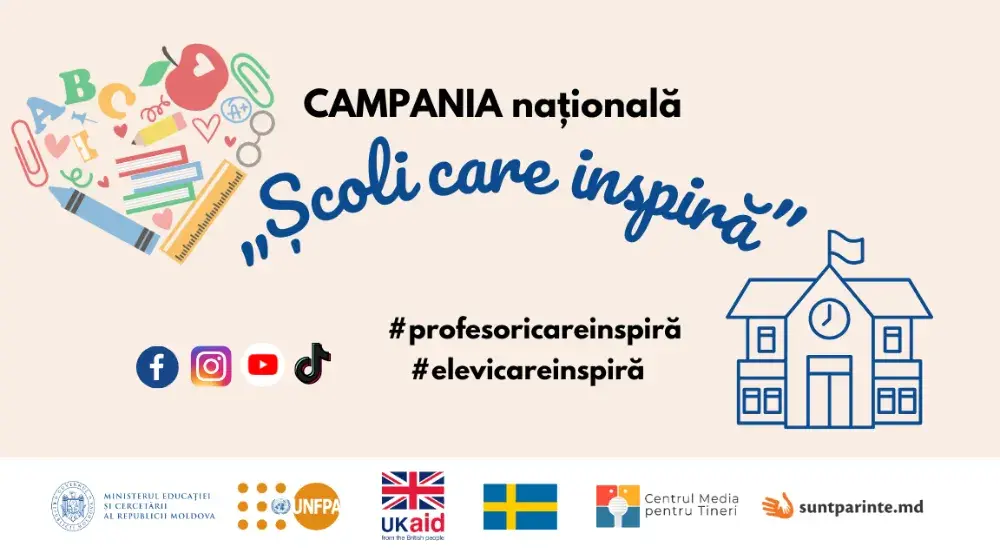Today, 21 OCTOBER 2020, the results of the analysis ‘COVID-19 AND YOUNG PEOPLE: The effects of the pandemic on the psycho-emotional well-being’ were presented. The pandemic has psychological implications for the entire population, but different age groups experience these effects differently. This analysis focused primarily on the psycho-emotional well-being of young people, aged 15-24, across the pandemic period of March-June, and tackled how they responded to the isolation measures imposed by the authorities. Although the measures were reasonable and necessary, they produced significant effects on the psycho-emotional well-being of the population. Staying away from school, work, friends, etc. amplifies fear, anxiety, sadness.
Young people were experiencing problems of psycho-emotional well-being before the onset of the pandemic crisis too. According to a survey conducted in 2018, about 36% of young people in Moldova were deprived[1] and dissatisfied with their situation in one or more areas of well-being: health, education, employment, participation and inclusion. Problems of psycho-emotional well-being persist in 2020: 1 in 10 young people is dissatisfied with their living conditions, both from a social and economic perspective.
With the spread of the pandemic, anxiety, depression and emotional distress exacerbated. A share of 20% of young people reported a worsening of their psycho-emotional state during the pandemic crisis, compared to the first months of the year (January, February). The negative effects of lockdown measures were pronounced the most among girls, young people in urban areas and those with modest income.
Young people with disabilities were more affected by the restrictions imposed during the pandemic. A share of 38% of young people with disabilities experienced high levels of anxiety, compared to 29.5% of those without disabilities. The psycho-emotional well-being of young people in cities was affected to a higher degree: it worsened in the case of 25.7% of young people in rural areas and 34.4% in urban areas.
Dissatisfaction with one's own lifestyle, physical isolation and distancing measures have also caused changes in behavior. Thus, during the isolation period, risky behaviors increased in intensity and frequency, compared to the period before the onset of the pandemic. Of the total number of young people who used tobacco in the pre-pandemic period (24%), about 38% smoked more frequently during the pandemic crisis. Of those who previously had a tendency of self-inflicted cutting/wounds (6.5%), about 13% say they had more such attempts during the lockdown. The rate of violence also increased, which led to a considerable deterioration in the psycho-emotional well-being of young people.
Changes in psycho-emotional well-being, but also in behavior, determined an urgent need for support. One-third of young people felt the need for help during the pandemic crisis to overcome/alleviate anxiety and depression, but also to maintain emotional integrity. The need for support is higher among girls, who were the most affected psycho-emotionally by the pandemic crisis (43% of all girls and 17.9% of boys were in the group of those affected).
Although the group that was affected the most by the pandemic crisis needed the most help to overcome crisis situations, it received the least support. Half of the young people with the lowest level of psycho-emotional well-being needed support during the pandemic in order to cope with anxiety. However, only about 60% of them sought help, while 20% were unable to obtain this support.
It was found that young people who were already subjected to violence before the pandemic, were abused even more often during the lockdown. Thus, during the crisis, violent behaviors intensified, the frequently abused groups have become even more vulnerable (including because of limited access to support). The application of severe forms of violence intensified the most – threats of being hit with an object, with the hand or kicked and being actually hit – about 22%.
In order to remedy the situation regarding the psycho-emotional well-being of the population, especially that of young people, national authorities need to develop a comprehensive and appropriate response in the form of policies, programs and support measures. In order to achieve this goal, several elements are needed: (i) Mainstreaming the psycho-emotional and mental health aspects into authorities’ policy response to the impact of the COVID-19 pandemic, (ii) Developing strategies to combat the effects of the COVID-19 pandemic that meet the needs of young people, (iii) Involving young people in the process of conceptualizing and developing the policy and program response, (iv) Allocating financial resources for complex support measures/programs, (v) Ensuring continuous support for maintaining psycho-emotional well-being at a high level, (vi) Developing social partnerships.
The material was produced by the Center for Development Partnership, within the Joint Fund for the Development of Youth Centers and Strengthening the Participation and Civic Involvement of Young People in the Republic of Moldova of the Ministry of Education, Culture and Research, the Swiss Agency for Development and Cooperation and the United Nations Development Fund.
[1] In this context, deprivation refers to the disadvantaged conditions of young people and disparities among them, in terms of access to resources, quality services, equal opportunities in different areas of well-being: health, education, employment, participation, inclusion.





